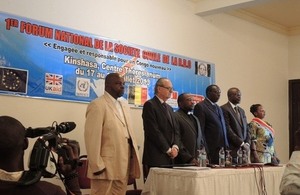UK aid promotes consultation within DRC civil society
With UK aid support, the Civil Society National Forum was held in Kinshasa from 17 to 20 July 2013.

Opening ceremony of the Civil Society National Forum, Kinshasa, Democratic Republic of Congo, 17 July 2013.
More than 200 representatives from faith-based and civil society organisations participated with the aim of establishing a consultation framework and a mechanism to enable civil dialogue, while contributing to participatory democracy and sustainable peace. The Forum will also help the British government have a better understanding of the challenges facing Congolese civil society.
UK aid supports the development of Congolese civil society by encouraging organisations to work together on key issues. The better organised the civil society, the more efficient it tends to prove in promoting good governance and accountability. One of the aims of civil society is to ensure the population is actually benefiting from the social services that local authorities have committed to providing.
UK aid is currently supporting Congolese civil society through the Civil Society Fund for Good Governance programme, co-funded with Sweden and implemented by Christian Aid.
UK aid is also currently supporting the development of effective Congolese civil society organisations by funding:
-
NGOs SANRU and CARITAS via the IMA World Health implemented Access to Healthcare programme, supporting a total of 41 health zones in DRC
-
Local NGOs through the UN-administered Humanitarian Pooled Fund, to which the UK is the largest donor
-
150 local NGOs through the UNICEF implemented Healthy Villages and Schools programme, which improves access to water, sanitation and hygiene services for communities in DRC
The Civil Society National Forum is also supported by the European Union, the United Nations Mission for Stabilisation of DRC, the United Nations Development Programme, France and Belgium.